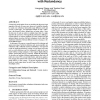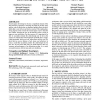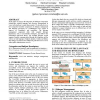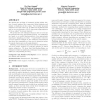136
click to vote
WWW
2007
ACM
16 years 3 months ago
2007
ACM
Current web search engines focus on searching only the most recent snapshot of the web. In some cases, however, it would be desirable to search over collections that include many ...
WWW
2007
ACM
16 years 3 months ago
2007
ACM
88
Voted
WWW
2007
ACM
16 years 3 months ago
2007
ACM
Traditional clustering algorithms work on "flat" data, making the assumption that the data instances can only be represented by a set of homogeneous and uniform features...
109
click to vote
WWW
2007
ACM
16 years 3 months ago
2007
ACM
Search engine advertising has become a significant element of the Web browsing experience. Choosing the right ads for the query and the order in which they are displayed greatly a...
84
Voted
WWW
2007
ACM
16 years 3 months ago
2007
ACM
In this paper, we consider a way to represent contact center applications as a set of multiple XML documents written in different markups including VoiceXML and CCXML. Application...
108
Voted
WWW
2007
ACM
16 years 3 months ago
2007
ACM
In this paper we propose the integration of intelligent components technologies (natural language and discourse management) in voice web interfaces to make them smarter. We descri...
103
click to vote
WWW
2007
ACM
16 years 3 months ago
2007
ACM
We address the problem of measuring global quality metrics of search engines, like corpus size, index freshness, and density of duplicates in the corpus. The recently proposed est...
118
Voted
WWW
2007
ACM
16 years 3 months ago
2007
ACM
The development of user interfaces (UIs) is one of the most timeconsuming aspects in software development. In this context, the lack of proper reuse mechanisms for UIs is increasi...
121
Voted
WWW
2007
ACM
16 years 3 months ago
2007
ACM
The aggregation and comparison of behavioral patterns on the WWW represent a tremendous opportunity for understanding past behaviors and predicting future behaviors. In this paper...
114
click to vote
WWW
2007
ACM
16 years 3 months ago
2007
ACM
This paper proposes a random Web crawl model. A Web crawl is a (biased and partial) image of the Web. This paper deals with the hyperlink structure, i.e. a Web crawl is a graph, w...




